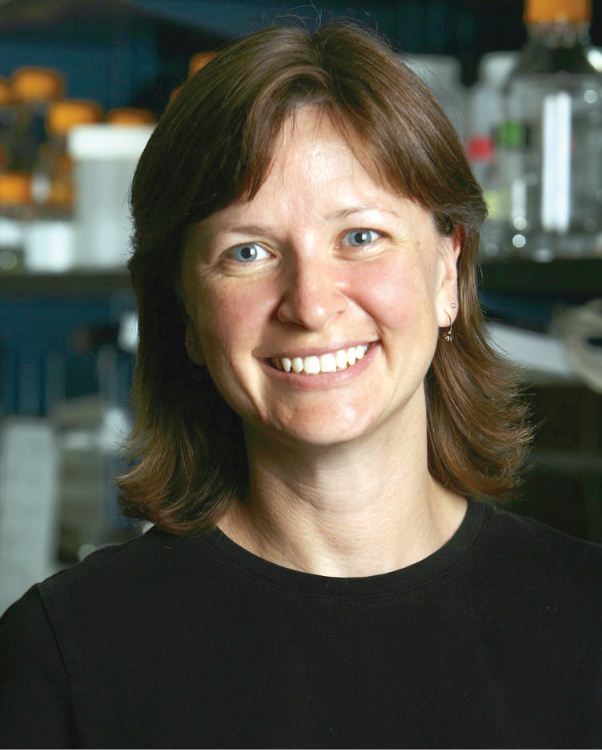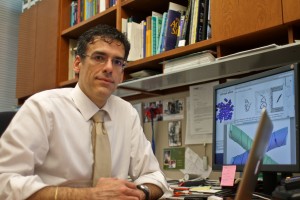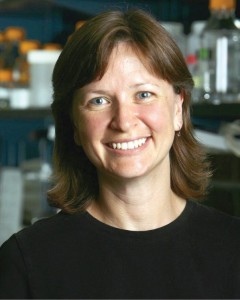
22 Jun Town Talks: Diversity in the Chemistry Lab & Smarty-Pants Bacteria

Rigoberto Hernandez, this week at TSRC’s Town Talk
TSRC’s Town Talks series continues on Tuesday, June 25, this week presenting topics critical not only to scientific advancement, but also pertinent to the equality and health of human beings. Professors of Chemistry and Biochemistry, Rigoberto Hernandez, Georgia Institute of Technology, and Patricia Clark, University of Notre Dame are the speakers, who will present their research and insights at the historic Sheridan Opera House, starting at 6 p.m.
Hernandez’s talk, “Advancing Science through Diversity,” describes how social science findings, like stereotypes and organizational structures, impact scientific research. Hernandez is the director of Open Chemistry Collaborative in Diversity Equity, or OXIDE. This collaboration aims to identify root causes of inequity in chemistry’s academic settings and propose scientific solutions to alter the dynamic.
Hernandez stressed that U.S. demographics are changing dramatically and people doing science need to reflect cultural shifts. The four major factors that define underrepresented persons, he said, are gender, race, sexual orientation, and disability. This is where OXIDE focuses its efforts.
“Scientists are comfortable collaborating with other scientists outside of their fields, but as soon as you hit diversity, a fear of the unknown takes over.”
A fear that stifles the creation of new ideas.
Hernendez’s work through OXIDE implements scientific methods to describe social disparities, a merging of social and physical sciences. In his talk, Hernandez will highlight examples of inequity, such as solo status, implicit bias, the cost of a name, and subtle cues that establish unconscious social barriers.
“It’s about diversity equity,” said Hernandez. “When you have more diversity, you increase the possibility of new types of interaction modes,” which in turn, “are required to achieve scientific excellence.”
Clark is part of the gender minority among chemistry professors. She thinks Hernandez’s work is one of the greatest efforts to increase faculty diversity. Clark’s talk, “Nimble Bacteria: How They Sense Their Environment to Infect and Outwit,” divulges mechanisms of antibiotic resistance.
“Antibiotics have been incredibly helpful, it’s how we are using them that is not working.”

Patricia Clark, guest scientist at TSRC”s Town Talk
Clark’s lab investigates protein folding, which led her to study the autotransporter proteins, a family of virulence proteins unique to pathogenic bacteria. When pathogenic bacteria invade our bodies, they set up what’s called “housekeeping,” explained Clark. They get in, hold on, hide from our immune system, and eat nutrients right out of our cells. They do this with their own army of virulence factors, which trick the body into thinking they belong.
“It’s not that bacteria are smart,” said Clark. “They just rely completely on statistics.”
Turns out, the odds are in their favor. Bacteria double in population every 20 minutes, really fast evolution. That means bacteria have a staggeringly high chance of propagating a mutation, one that may confer resistance to an antibiotic. According to Clark, the real problem occurs when we add an antibiotic that doesn’t shut down 100% of the bacteria. The stronger ones (with the lucky mutation) live and multiply.
In her talk, Clark will elaborate on what scientists are doing to overcome bacteria’s nimble ways. Instead of making drugs that target a feature common to all bacteria, scientists are focusing on ones that target specific virulence factors.
National laboratories and universities around the world contribute to and support the work of Hernandez and Clark.
Public support is strongly encouraged and Town Talks are free. Again, Tuesday night, at 6 p.m. at the Sheridan Opera House.
TSRC Town Talks run all summer long.
Check out the lineup at telluridescience.org.


Sorry, the comment form is closed at this time.